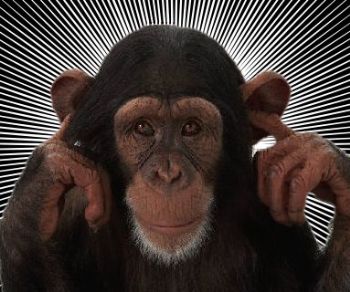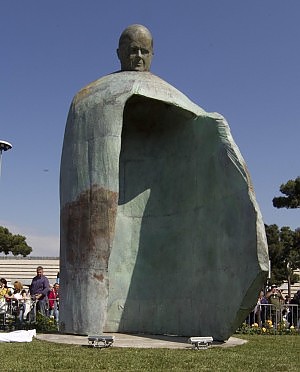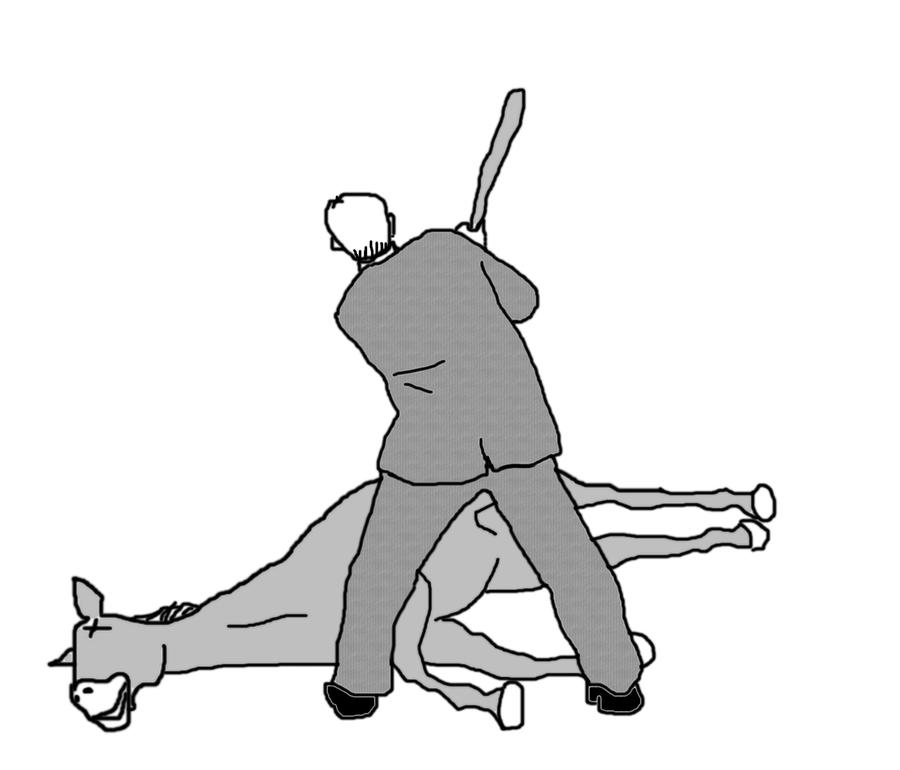Here I present seven proofs for the existence of God set to a musical soundtrack. When I say proofs for the existence of God, I do not mean that these proofs are irrefutable (technically, anyone can refute anything), what I am saying is that the evidence and logic appear to be overwhelmingly on the side of these particular arguments. Reason demands that we accept these proposals because the alternative requires far more of a leap of faith in the end. Obviously these songs were not written necessarily with these proofs in mind, though the questions they raise are inevitable. Therefore, in spite of the fact that Aquinas and others were initially the ones who formulated them, they are in no way foreign to our natural instinct. Indeed, whenever I ask my students what for them is the most convincing proof of God's existence, their response almost inevitably falls under one of these respective categories.
Pascal's Wager - Roll the Bones (Rush)
Known as a bit of a arm-chair philosopher, the drummer for the band Rush, Neil Pert, has often infused interesting themes into the bands songs. This early 1990s song, off the album of the same title, is no different. In essence the song is about fate and how everyone in one way or another is a prisoner of it. Yet in spite of one's temptation to live in a fatalistic fashion, it is wiser, or so argues Pert, to "roll the bones", or to "wager" in favor of a meaningful existence. Is it possible to know whether God is benevolent, or if he even exists at all? Perhaps not. But then again, what do we really have to lose if we live as if our actions did matter? If we play it safe and do nothing, we may avoid some danger and safeguard certain worldly goods, but we will also miss out on those things which are more dramatic and beautiful. In the end even if we were wrong about the meaning of life, what difference will it make... we're dead? "Why doesn't it happen? Because it happens. Roll the bones, roll the bones. Why are we here? Because we're here. Roll the bones. Roll the bones". In a song by Rush called "Free Will", this idea is further explicated; "If you choose not to decide you still have made a choice." Pert is not speaking specifically about belief in God here, but his message still applies in either case. The best way to sum up this "wager" is by recounting the story of Flight 93. For those unfamiliar, the plane was highjacked on 9/11, and was destined to be used as part of the terroristic plot (much like the other planes were used). Nevertheless, a few people on the flight huddled together and decided that they would foil the plot. They reasoned that they were going to die anyway, so they should do everything in their power to prevent any further carnage. Consequently, instead of cowering in fear they we are able to marshal enough courage to give themselves to the greater cause of saving the lives of others. Technically, Pascal's Wager is not really a proof for the existence of God, but it is a lowest common denominator argument for belief. No one can prove that there is a God absolutely, but doesn't everything in us (including the beauty that we recognize in self-sacrifice) scream to us that it is worth the risk? The truth is in some sense we are all on board of Flight 93, and so we all must "roll the bones" and make a decision about what is the highest good. Death is fast approaching, and whether we like it or not, a decision must be made. Will we wager on the greatest good, or will we choose in fear to go down in flames as a self-serving coward. The choice is ours.
The Argument from Design - Heaven (Live)
The argument from design is a relatively simple one. Wherever we recognize some kind of design (i.e. a watch), we presume there is also a designer who constructed it. According to the argument, this idea also extends to nature as well. Now some may argue that what holds true from a human standpoint doesn't necessarily apply in the context of the larger development of the cosmos. And on the surface this would seem to be a good argument, for analogies always tend to limp a bit. However, the problem with this rebuttal is that one of the primary principles of physics is that an effect cannot be greater than its cause. Hence, if we as human are "hard-wired" in such a way as to recognize design, and are likewise inclined to design things from the materials themselves that are presumably capable of the same, then what kind of argument is it to say that the cosmos has not been made in such a way so as to facilitate the aforementioned design? The cosmos possesses all of the material to do precisely that, so doesn't it make sense that if the materials to make an engine exist (not to mention a human mind to conceive of it), that this presupposes the concept of design. The song "Heaven" by the band Live is not quite as specific as all that, but nevertheless lays out the basic premise of the argument. The song in essence is a push back against a form of rationalism and empiricism that is used in the service of undermining faith. In fact, what the lead singer Ed Kowalczyk preaches is a form of fideism that seems to suggest practically the other extreme; "You don't need no friends, to get back your faith again. You have the power to perceive... I'll believe it when I see it for myself.." For the moment we will set aside what sounds like a kind of Cartesian fideism, and focus instead on the part of the song that is suggestive of the argument from design; "I don't need no one to tell me about heaven, I look at my daughter and I believe. I don't need no proof, when it comes to God and truth, I can see the sunset and I perceive." The experience of awe, and the capacity to recognize beauty in the cosmos, in itself suggests that man perceives in creation something more than just chance, much less an "un-directed processes". Certainly the argument from design cannot of itself prove God's existence, but it does demand some serious answers from the one who would believes that our universe involves some sort of gigantic game of evolutionary Plinko. The question could be phrased like this: what requires more faith; to believe in a Designer, or to accept a series of coincidences so large that any fairytale would seem mundane by comparison?
The First Cause - I Must Have Done Something Good (The Sound of Music)
The Argument from Conscience - Tempted (Squeeze)
The Argument from History - Viva La Vida (Coldplay)
The argument from history is a broader one, but in my opinion no less potent. The argument (or at least part of it) is a little like the argument from design, but applied to history in this instance. In other words, what is the greater miracle; that the twelve apostles- many of whom were relatively uneducated- spread a religion about a man that has on every level of existence changed the world philosophically and morally for the better; inspiring hospitals, universities, architecture, literature, art, music, morality, science, culture, etc., thus providing sufficient evidence to substantiate the fact that Jesus is who he says he was, or that bunch of average Joe's, some might call them yokels, invented this unparalleled institution. All this and I still haven't even mentioned the fact that the "institution of the fishermen" is still up and running today, inspiring individuals across the globe not only to live for Him, but more importantly those who are willing sacrifice their lives for him, not by blowing themselves and others up, but rather by courageously professing Christ, even while losing all worldly comforts in the process. If you believe this is an accident, then you have far greater faith than I! In any case, how does this argument manifest itself in popular music today? It does so in a couple ways. For example, Leonard Cohen who is a professed Buddhist (though he is originally of Jewish descent), has written several songs about saints (Joan of Arc and Bernadette of Lourdes). Hence, even for one who does not profess the faith explicitly, the courage and mission of some of the great saints still manages to capture their imaginations, even hundreds of years after their death. Yet even when popular artists criticize the Church as power hungry and/or anachronistic, they tend to do so in such a way that highlights the distinctiveness of the Church, even while trying to condescend her (e.g. Sting's "All This Time"). Yet if the Church is really as outmoded and anachronistic as these artists seem to think, then in what sense would it be impressive or fashionable to criticize it. In other words, if the Church weren't a real force in the world, then criticizing it would sound as dumb and redundant as offering a full-throated rebuke of the Visigoths or the Magyars. By contrast, the song "Viva La Vida" does not fall under this category of condescension, but rather offers a sweeping endorsement (at least poetically speaking), of the power and beauty swirling around the history of the Church. What I mean to say is that the lyrics (as well as the soaring music) demonstrates on many levels that the Church, as well as the Scriptures, provide imagery that transcends time and culture; "I hear Jerusalem bells are ringing, Roman Cavalry choirs are singing. Be my mirror, my sword, and shield; my missionaries in a foreign field. For some reason I can't explain. I know St. Peter won't call my name. Never an honest word. But that was when I ruled the world". Lead singer Chris Martin has revealed on several occasions that this song concerns his bad behavior as a young man. He doesn't necessarily mention anything about penance in these interviews, but he really doesn't have to. In essence the entire song is a quintessential ode to to Christian Redemption, not to mention a very solemn recognition of one of the quintessential Biblical paradoxes; "What good is it for a man to gain the whole world, and to lose his soul in the process". And how does he express this sentiment? By providing a lyrical barrage, if not a collage, of Christian imagery; "I used to rule the world, seas would rise when I gave the word... now I discovered that my castles stand upon pillars of salt, pillars of sand. Revolutionaries wait for a my head on a silver plate..." The true artist goes with images that work best, and if these images didn't still speak to the poets soul (even in the negative sense as with Sting), they would scarcely be used.
The Argument from Degree of Perfection - Human (The Killers)
Technically this is part of the "First Cause" argument, but I would argue that it deserves its own category. The proof essentially goes like this: in order to give something a value, there has to be some perfect Value by which you measure it. So if I call something "beautiful", "perfect", good, or even bad, I am implying by these statements that there is a standard by which I can make this assertion. If there is not such a standard then such valuations are meaningless. Some may argue that this terminology is used purely for practical purposes. However, if this objection were genuinely true, then how can you declare with any real force and substance that someone like Hitler is a bad man? Or how would you be able to say that the behavior of a child molester is objectively wrong? If there is no reality behind the standards we set, then it is just as valid to regard a piece of "ugly" modern art (like the one above), in the same way you regard the Pieta, or the murals in the Sistine Chapel. The point isn't that there are not discrepancies when it comes to these basic questions, but if we truly believe there is no ultimate standard that can be debated, then does this not mean that all of our attitudes and convictions are arbitrary and meaningless? Are we not then simply a race of animals imputing meaning where there is none at all? In any event, some may be in complete agreement with this assessment, saying in essence, "I'm OK with that. What's it to you?" The song "Human", written and performed by the Killers, deftly points out the price that we would all pay for failing to acknowledge the higher Standard behind the human one; "Pay my respects to grace and virtue. Give my condolences to good. Give my regards to soul and romance, they always did the best they could. And so long to devotion, you taught me everything I know. Wave goodbye, wish me well. You've gotta let me go. Are we human? Or are we dancer? My sign is vital, my hands are cold. And I'm on my knees looking for the answer. Are we human? Or are we dancer?" Setting aside the debate on the exact meaning of the word "dancer" here, the lyrics are otherwise relatively transparent. If our humanity is not in some way ultimately grounded in the idea of an Absolute, then every virtue we propose (which would include "love", "hope", "freedom", "free-will", "dignity", "beauty", etc.) is utterly meaningless and without substance. Indeed, if you truly want to "wave goodbye" to these standards, then you must also say goodbye to everything that makes us truly human. If, on the other hand, you wish to preserve these principles, while simultaneously rejecting the larger Principle behind them, then you are little more than a delusional animal, an absurd "dancer", who inexplicably imagines himself to be divine, when in fact he is little more than dust.
The Ontological Argument - I Don't Want to Miss a Thing (Aerosmith)
The argument St. Anselm made famous goes something like this; "That than which nothing greater can be conceived". Translated for "earth people" it can be understand in this way: To whatever extent something can be conceived of, it has existence by virtue of the fact that it can be conceived (even if only conceptually). And indeed this is an interesting exercise. Simply try to envision (or imagine) something that doesn't currently exists. You cannot. Well, you say, I can imagine an elephant that flies with its tail, and that doesn't exist. Nevertheless, all you are doing in this instance is simply reconfiguring (like Mr. Potato Head) parts and ideas that already do exist. Perhaps next you will point to the fact that there are no such things as dragons and unicorns. Yet even as it relates to these "non-existent" things, they may very well simply be a conglomeration of pre-existent ideas which have been mythologized. In the case of a unicorn, we actually do see the appearance of this word already Scripture. However, in the case of Scripture it appears to be referring to a Rhinoceros (which of course has one horn). All the same, is it so difficult to envision a horse with one horn? In the case of the dragon, there has been much speculation as to the origin of this idea. Nevertheless, when you consider the existence of dinosaur fossils (the word suffix "saur" is suggestive of lizard), it is not surprising that one might develop a mythology which surrounds these creatures. In fact, there are many things in nature which might unleash the imagination of both young and old alike. From gigantic human eating snakes, to mysterious Leviathan-like sea monsters, the potential for a creature that represents a Mr. Potato Head version of the sum of all fears is not beyond the realm of possibility. But even if that were not the case, to me what is even more of a mystery is why there are so few of these "non-existent" creatures in the first place. Indeed, the fact that there are so few of them makes me all the more curious about their origins. The second part of the ontological argument points out that if it is possible to envision this absolutely Perfect Being, then not only must it exist as a concept, but it must also exist as a reality. For the most perfect form of existence is not simply to exist as an idea, but rather fully and completely. A poem about love can be moving, it may perhaps even move you to tears, but a poem about love is nothing compared to being in love itself. In other words, the poem about love implies the existence of Lovers, yet if there is no truth to love, then why would you conceive of it in the first place? Far from being a good thing then, if love is merely a product of our collective imaginations, then it would seem to be a kind of torturous delusion. Yet how can one account for such a universally held "delusion" by simply dismissing it as a delusion? Such logic would seem to be rather circular. Hunger implies food; love implies a beloved; but the idea of God is nothing more than an invention of the mind? Some may argue that God is a sort of personification of man's highest ideals and virtues, but that nevertheless still begs the question about the source of those Ideals (see the "Argument from Perfection"). Anyhow, I think Aerosmith captures it best in the song "I Don't Want to Miss a Thing" from the movie soundtrack to the film Armageddon; "Don't want to close my eyes/ Don't want to fall asleep/ 'Cause I'd miss you babe/ And I don't want to miss a thing/ 'Cause even when I dream of you/ The sweetest dream would never do/ I'd still miss you baby/ And I don't want to miss a thing." As the world is careening towards chaos/ Armageddon, what matters most to the Ben Affleck character is not some pleasant dream about his beloved (for apparently even the "sweetest dream" will not suffice). No, the reason he is willing to forego sleep, is because love in the concrete sense is always preferable to love in the abstract. Even a blissful dream about heaven is nothing compared to the reality.


























